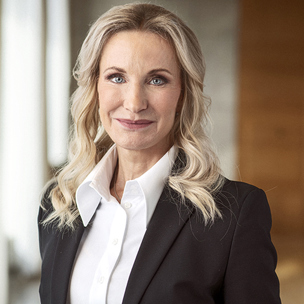Sweden's digital infrastructure must be strengthened
Sweden’s digital infrastructure must improve its ability to withstand disruptions, crises, and conflicts. This could be crucial for our ability to maintain critical societal functions and for the competitiveness of the business sector. In the newly launched project ‘Resilient Digital Infrastructure,’ the Royal Swedish Academy of Engineering Sciences (IVA) will map out what is required to create world-class digital infrastructure.


"Sweden is one of the most digitalised countries in the world, and we have never been more dependent on digital infrastructure."
"It is crucial for the competitiveness of the business sector and an important part of our total defence, as well as a prerequisite for the functioning of our most critical societal functions," says IVA Fellow Pia Sandvik , CEO of Teknikföretagen and chair of the steering committee for the new IVA project.
"Digital technology and digital systems are now integrated into all parts of society. This includes everything from communications and transport to energy supply, financial systems, and industrial production processes. When all these components need to be integrated and interact, a digital infrastructure consisting of multiple layers is required, ranging from passive fibres and masts, through networks and applications, to data and information management and services.
“Today, many different actors, both private and public, operate the various parts of this infrastructure. It is the result of their collective actions that determines how this structure develops and changes, and ultimately whether it is robust and resilient enough to handle future challenges,” says Pia Sandvik.
Better coordination is key
One of the overarching goals of the IVA projectis to ensure that Sweden’s digital infrastructure, in terms of capacity, quality, and security, can compete with the most advanced countries in the world. However, assessing how well we currently stand compared to other countries is not straightforward, as it depends on many different factors.
"A strength we have in Sweden is that we live in a market economy and have generally managed the infrastructure well with regulations and several competing actors. This has led to diversity, made us good at innovation, and finding effective solutions," says IVA Fellow Patrik Fältström, Chief Security Officer at Netnod and a member of the project’s steering committee.
At the same time, Sweden is a more distributed and fragmented society than many other countries. We have many municipalities, regions, authorities, requirements, and regulations to follow. This can create challenges in fitting together the pieces that may be the most crucial for building a digital infrastructure that can meet future demands for resilience, efficiency, and sustainability.
"There are many individual companies, organisations, and authorities doing a good job. But the most important thing is that we, as a society, need to become better at coordinating, planning, and developing this infrastructure together. This is where we need to improve the most. This is the project’s thesis,” says Patrik Fältström
Focus on the competitiveness of business and industry
Building an efficient and resilient digital infrastructure is a crusial part of Swedish preparedness, but it is also a prerequisite for keeping the Swedish economy running. Therefore, an important focus of IVA’s project is on how it affects the conditions for the business sector. For example, what measures and changes need to be made at the political level to make it easier for actors in society to act and contribute. This is important for Sweden’s international competitiveness.
"If we gain a reputation for not having sufficient stability in critical societal functions, such as our energy supply being at risk, our transport system being vulnerable, or the potential for chaos in our decision-making systems, there is a risk that Sweden will become a country where foreign companies and investors are hesitant to enter and invest. This can significantly impact our competitiveness," says Pia Sandvik.
In this work, it is important to focus on being constructive and swift.
“It is incredibly important that we focus on what can be done now and not wait too long. We need to find actions that have a quick impact,” says Patrik Fältström.
Scenarios to contribute to steps forward
Today, there is already political awareness that investments in digital infrastructure need to be made. A few months ago, the government presented a total defence bill for the years up to 2030. It states that they plan to invest almost 36 billion SEK extra in civil defence, of which digital infrastructure is a part.
“What is missing is knowing who needs to do what to solve the problems and deficiencies we have,” says Patrik Fältström.
"To contribute to this work, specially composed expert groups within the IVA project, with representatives from industry, the public sector, and academia, will develop relevant scenarios for potential disruptions and crises. The goal is for these to ultimately result in concrete and feasible action proposals.
“It is not clear today what needs to be changed and what is expected of different actors. Here, we hope to contribute some important pieces of the puzzle,” says Pia Sandvik
About Pia Sandvik
Pia Sandvik is the CEO of Teknikföretagen, which represents over 4,000 technology companies in areas such as telecommunications, computer technology, electric power, and transport. She has previously been the CEO of the research institute RISE and the Vice-Chancellor of Luleå University of Technology.
Pia Sandvik is a fellow of the Royal Swedish Academy of Engineering Sciences (IVA) since 2009.

About Patrik Fältström
Patrik Fältström is Chief Security Officer at Netnod. He is also a part-time employee of the Swedish Armed Forces, where he holds the rank of Major. For the past three years, he has led the Swedish team in Locked Shields, the world’s largest live cyber defence exercise, which is annually organised by NATO’s Cooperative Cyber Defence Centre of Excellence (CCDCOE) in Tallinn.
Patrik Fältström is a fellow of the Royal Swedish Academy of Engineering Sciences (IVA) since 2013.


